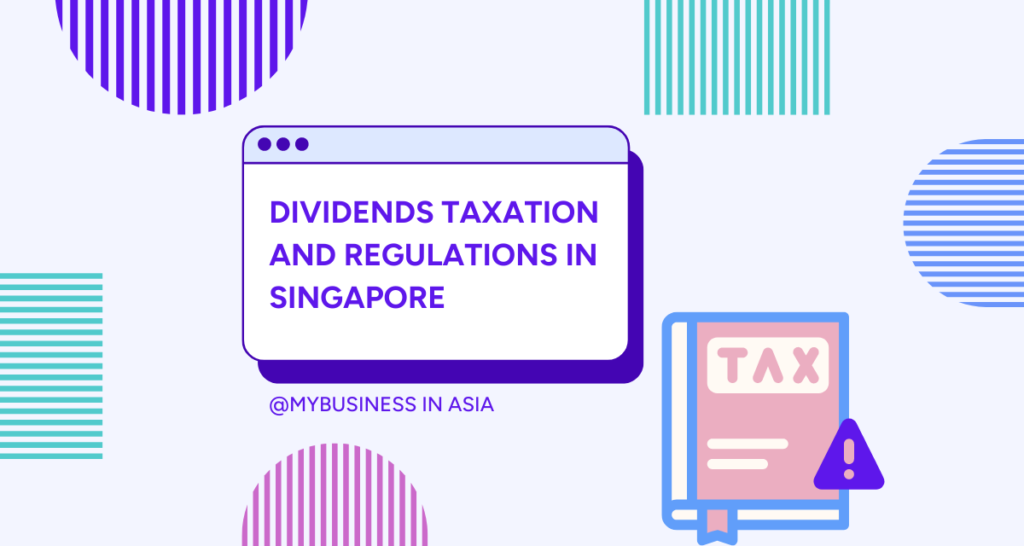
Dividends are a way for companies to distribute profits to their shareholders. In Singapore, dividends are defined as the distribution of a company’s profits to its shareholders, based on the number of shares they hold. The Singapore Dividend Tax and Regulations are important topics to keep in mind when considering how to distribute profits of a company to shareholders.
In this article we explain how dividends from a Singapore resident company are taxable through the corporate income tax of international and resident individuals alike. Although, they are no subject to withholding taxes.
Legal and Taxation Definition of Dividends in Singapore
The legal framework governing dividends in Singapore is the Companies Act, which requires that dividends be paid out of profits, and prohibits companies from paying dividends out of capital.
The taxation of dividends in Singapore is governed by the Income Tax Act, which taxes dividends as income in the hands of the recipient. Dividends received in Singapore are subject to the personal income tax.
There are several obligations and regulations that companies must adhere to when paying dividends in Singapore.
Firstly, companies are required to maintain adequate records and accounts of their financial transactions, including dividends. The business accounting services are thus critical for the compliance in regard of company taxes.
Secondly, companies must comply with the requirements of the Companies Act, which govern the payment of dividends.
Thirdly, companies must comply with the regulations of the Singapore Exchange (SGX), which require listed companies to disclose their dividend policy and pay dividends in a timely and consistent manner.
Common Practices for Dividends in Singapore
One important aspect to note is that Singapore has no withholding tax on dividends, which is an advantage for foreign investors looking to invest in Singaporean companies.
Some other type of payments such as royalties, some type of interest, commissions and fees can be subject to withholding tax. We recommend reading our article on withholding taxation of royalties to better understand it.
This makes Singapore an attractive destination for foreign investors looking to invest in companies that pay dividends. Since dividends fall in standard taxable income, it is also possible to benefit from taxes exemption schemes to lower taxed income due to dividends.
Another noteworthy aspect of dividends in Singapore is that companies are not legally required to pay dividends to their shareholders.
Companies may choose to retain their profits for future growth and expansion, or to pay dividends to their shareholders as a way to reward them for their investment in the company. This flexibility allows companies to make decisions that are in the best interest of their business, while also taking into consideration the needs and expectations of their shareholders.
Issuing dividends in Singapore
Issuing dividends as a private limited company in Singapore involves several steps. Private limited companies are required to comply with the Companies Act and the Articles of Association in order to pay dividends.
- Ensure that the company has sufficient profits to pay dividends, as dividends cannot be paid out of capital.
- The board of directors must approve the payment of dividends and determine the amount of the dividend payout. They must also ensure that the dividend payout does not negatively affect the company’s financial stability or growth.
- Call for a general meeting and obtain the approval of the shareholders for the dividend payout through a resolution (it can be a Board resolution, an ordinary resolution or a special resolution).
- Once the dividend payout has been approved, announce the dividend to the shareholders, either through a circular or through the company’s website. The announcement must include the details of the dividend, such as the amount, the payment date, and the record date.
- Set the record date, which is the date on which the shareholders must be on the company’s register in order to be eligible to receive the dividend.
- On the payment date, the company will distribute the dividend to the eligible shareholders, either through electronic transfer or by issuing dividend cheques. The company must also maintain adequate records of the dividend payments and provide the necessary documentation (e.g., dividend vouchers) to shareholders for tax reporting purposes.
By following the proper procedures, private limited companies in Singapore can ensure that dividends are paid in a timely and consistent manner, while also maintaining their financial stability and growth.
Tax Implications of Receiving Dividends
In Singapore, dividends are subject to tax in the hands of the recipient as part of their taxable income. These represent the income from investment, salary, corporate interest, capital (e.g., stock), foreign sourced revenue, etc. This means that dividends will be added to the taxable income base. The tax rate depends on the tax residency status of the recipient.
For tax residents, the tax rate is based on the progressive income tax rates, ranging from 0% to 24%. For non-residents, the tax rate is 15% of the progressive tax resident rate, whichever is higher.
There are certain exemptions and reliefs available for certain types of dividends, such as those received from Singapore resident companies, and those received by individuals who hold shares in their own name.
Personal Obligations for Receivers of Dividends
Individuals who receive dividends in Singapore have certain personal obligations that they must comply with.
Firstly, they must report their dividend income in their income tax return.
Secondly, they must pay any tax due on their dividend income. Although, the dividends are not subject to a withholding tax from Singapore.
Thirdly, they must ensure that they have sufficient records and documentation to support their dividend income and tax liabilities. Failure to comply with these obligations may result in penalties and fines.
How the Dividend Systems Differ from Other Countries in the APAC Region
The dividend systems in Singapore differ from other countries in the APAC region in several ways.
Firstly, Singapore has a dividend imputation system, which means that companies can pass on the tax credits they receive from paying corporate tax to their shareholders. This helps to reduce the overall tax burden on dividends.
Secondly, Singapore has a tax-residency-based system, which means that the tax rate on dividends depends on the tax residency status of the recipient.
Thirdly, Singapore has a robust regulatory framework for dividends, which helps to ensure that companies pay dividends in a timely and consistent manner. It is also a preferred place for investment structuring for both foreign and resident business entities.
Prepare the distribution of your company’s dividends
In conclusion, paying and receiving dividends in Singapore is governed by a legal and regulatory framework that is designed to ensure that dividends are paid out of profits, and that shareholders are taxed on their dividends at the standard income tax rate. Dividends are not subject to a withholding taxation rate, and foreign sourced dividends received in Singapore receive an exemption too.
Companies must comply with various obligations and regulations when paying dividends, while individuals who receive dividends must comply with their own personal obligations.
MyBusiness in Asia provides a wide range of company services in Singapore. It includes tax, accounting, incorporation, business advisory and corporate structures. We can assist foreign and international with their company taxes and investment services in Singapore. You can contact us to know more about our comprehensive offering.
Read our other articles
- Understand how the ONE Pass and how to apply for this special Pass in Singapore.
- Apply for an EP in Singapore and understand the new COMPASS framework.
- Learn everything about the Stamp Duty for shares and calculator in Singapore
Or click our banner to discuss with us on how we can fully support your business!






